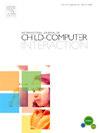“Someone who has ADHD or someone who has autism should make the Rules”: A participatory study of neurodivergent Child perspectives on the ethics of Extended reality technologies
Q1 Social Sciences
International Journal of Child-Computer Interaction
Pub Date : 2025-09-11
DOI:10.1016/j.ijcci.2025.100782
引用次数: 0
Abstract
Extended reality (XR) technologies have the potential to shift the digital landscape for young people's education, play, and social interactions. However, the immersive and data-intensive nature of these technologies also poses risks for young people, with autistic children and/or those with ADHD (i.e., neurodivergent children) experiencing specific vulnerabilities. We conducted an interview study with 21 neurodivergent children ages 8–13, drawing on animated speculative future use scenarios as a discussion prompt, to identify their views on the possibilities and limitations of XR technologies. While their ethical critiques overlapped significantly with those of neurotypical children in prior work, they also offered novel interpretations (e.g., the importance of neurodivergent individuals being involved in XR design; heightened potential for problematic media use with VR). This study contributes to the child-computer interaction community by surfacing the views of a population whose first-person accounts of novel technologies are underrepresented. In addition, our work offers valuable insights into ethical XR research with and design for neurodivergent children, considering their priorities, interests, and concerns.
“患有多动症或自闭症的人应该制定规则”:一项关于扩展现实技术伦理的神经发散性儿童观点的参与性研究
扩展现实(XR)技术有可能改变年轻人的教育、游戏和社会互动的数字格局。然而,这些技术的沉浸式和数据密集型性质也给年轻人带来了风险,自闭症儿童和/或患有多动症的儿童(即神经分化儿童)经历了特定的脆弱性。我们对21名8-13岁的神经分化儿童进行了访谈研究,利用动画预测未来使用场景作为讨论提示,以确定他们对XR技术的可能性和局限性的看法。虽然他们的伦理批评与之前工作中对神经正常儿童的批评有很大的重叠,但他们也提供了新的解释(例如,神经发散性个体参与XR设计的重要性;VR媒体使用问题的可能性增加)。这项研究通过揭示人们对新技术的第一人称描述不足的观点,为儿童电脑交互社区做出了贡献。此外,我们的工作为神经分化儿童的道德XR研究和设计提供了有价值的见解,考虑到他们的优先事项,兴趣和关注点。
本文章由计算机程序翻译,如有差异,请以英文原文为准。
求助全文
约1分钟内获得全文
求助全文
来源期刊

International Journal of Child-Computer Interaction
Social Sciences-Education
CiteScore
7.20
自引率
0.00%
发文量
73
 求助内容:
求助内容: 应助结果提醒方式:
应助结果提醒方式:


